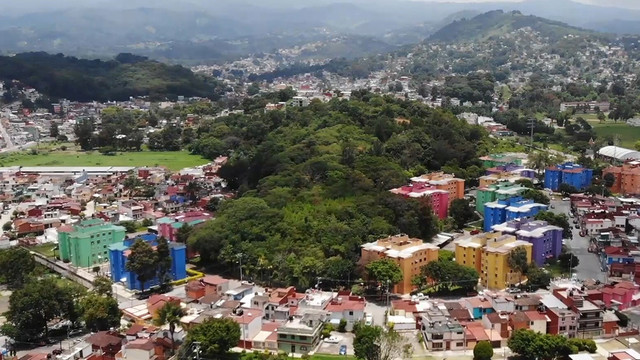How can we achieve a world without long-term refugee camps?
This hybrid IIED Debates on Wednesday, 27 September reflected on the possibility of a world without long-term refugee camps.

Syrian refugee camp in the outskirts of Athens. Over 6.6 million Syrians were forced to flee their home since 2011 (Photo: Julie Ricard on Unsplash)
The number of forcibly displaced people around the world reached a staggering 110 million in May 2023. Nearly half of all internally displaced people (IDPs) and 20% of the world’s refugees live in camps as default. Despite a growing body of evidence that living in cities creates better levels of wellbeing as well as more economic opportunities, many host governments require refugees to live in camps.
This hybrid IIED Debates explored what we can do to shift the narrative and move away from the current status quo. What are the barriers preventing change? And can we achieve a world without long-term refugee camps?
Refugee camps are intended to provide life-saving assistance in the acute phases of a displacement crisis when many thousands of people are crossing an international border to escape violence or conflict. But they often remain in place for decades. The building of camps is generally accompanied by restrictions on refugees’ rights to movement and to work, and camps are often built in remote regions with hostile climates.
As the attention and funding of the international humanitarian community moves on to other crises, the quality of life for refugees in camps decreases, leaving many dependent on declining food rations and with limited access to healthcare and education.
IIED’s research is exploring the negative impacts of camps on wellbeing and livelihoods, alongside the potential of towns and cities to provide a more dignified, fulfilling life for people in exile. This builds on earlier campaigns against refugee ‘warehousing’, led by the US Committee for Refugees and Immigrants (USCRI).
This hybrid IIED Debates event brought together three leading thinkers to reflect on the possibility of a world without long-term refugee camps.
It discussed how we can disrupt the current system that incentivises the building of camps, and the political and institutional barriers to a change in approach by the international community and hosting governments. It also examined the evidence that could help to dissuade decision-makers from establishing camps in the first place, or for keeping them open once a displacement crisis has become protracted.
Speakers
- Lucy Earle is director of the Human Settlements research group at IIED and lead for the 'protracted displacement in an urban world' project
- Romola Sanyal is professor in the geography and planning department at the London School of Economics
- Eskinder Negash is president and CEO of the US Committee for Refugees and Immigrants (USCRI)
- Loren Landau is professor of migration and development at the University of Oxford, research professor at the University of the Witwatersrand’s African Centre for Migration and Society, and co-director of the Wits-Oxford Mobility Governance Lab (MGL)
Coverage
You can watch a recording of the event below or on IIED's YouTube channel, where individual links to the start of each speaker's contribution are also provided.
About IIED Debates
This event was part of the IIED Debates series. Through the convening of expert speakers and external stakeholders, IIED brings together an international community to discuss critical issues.
IIED Debates encompass both physical and digital events, including critical themes, breakfast debriefs and webinars. These events are public and are hosted regularly throughout the year online and when possible in our London and Edinburgh offices.
IIED events newsletter
Sign up to our mailing list for updates and invitations to events throughout the year, including webinars, critical themes and debriefs.
Contact
Juliette Tunstall (juliette.tunstall@iied.org), internal engagement and external events officer at IIED




